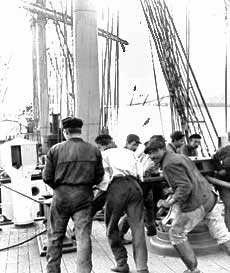Program Learning Goals
Submitted by admin on Tue, 01/02/2007 - 2:33pm.
By pursuing answers to the complex questions discussed in the program description and completing all program work, you will demonstrate some degree of accomplishment with respect to each of the following:
- Appreciating the impact historical maritime labor conditions have played in shaping the maritime workplace today;
- Understanding the ways in which maritime labor conditions historically reflected the larger structural power relations of class, race, and gender;
- Understanding the role that sail power played in the development of capital including the global trade that instigated exploration and exploitation in the Pacific Northwest;
- Being aware of the roles individuals play in creating work groups;
- Working collaboratively;
- Developing skills in group dynamics;
- Interpreting nautical charts using quantitative and symbolic reasoning including algebra and geometry;
- Understanding safety at sea, rules of the road, points of sail, and working on tall ships;
- Understanding concepts of the GPS;
- Understanding weather patterns;
- Communicating clearly through writing and speaking;
- Thinking critically, creatively, and holistically, as demonstrated through written work, work aboard the tall ships, and discussions;
- Developing and meeting one's own intellectual goals within the context of our learning community.
This program is also shaped by a strong belief in Evergreen's Five Foci:
- Interdisciplinary Study: Students learn to pull together ideas and concepts from many subject areas, which enables them to tackle real-world issues in all their complexity.
- Collaborative Learning: Students develop knowledge and skills through shared learning, rather than learning in isolation and in competition with others.
- Learning Across Significant Differences: Students learn to recognize, respect and bridge differences - critical skills in an increasingly diverse world.
- Personal Engagement: Students develop their capacities to judge, speak and act on the basis of their own reasoned beliefs
- Linking Theory with Practical Applications: Students understand abstract theories by applying them to projects and activities and by putting them into practice in real-world situations.
It will also help students work toward the following expectations the college as a whole has for its graduates:
- Articulate and assume responsibility for your own work.
- Participate collaboratively and responsibly in our diverse society.
- Communicate creatively and effectively.
- Demonstrate integrative, independent, critical thinking.
- Apply qualitative, quantitative and creative modes of inquiry appropriately to practical and theoretical problems across disciplines.

